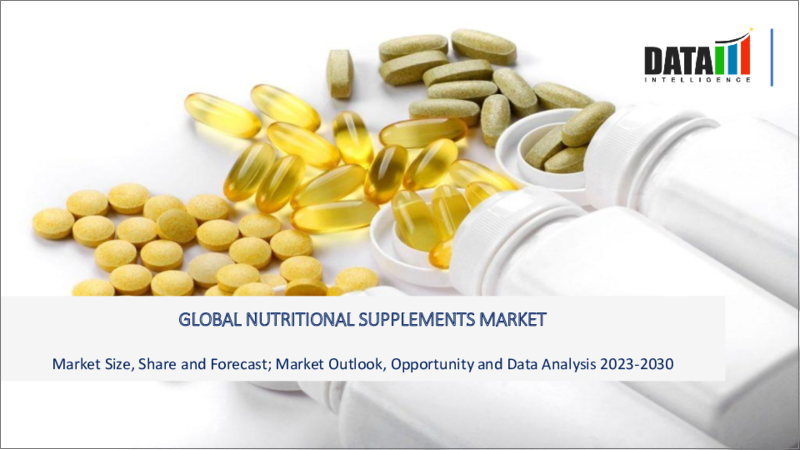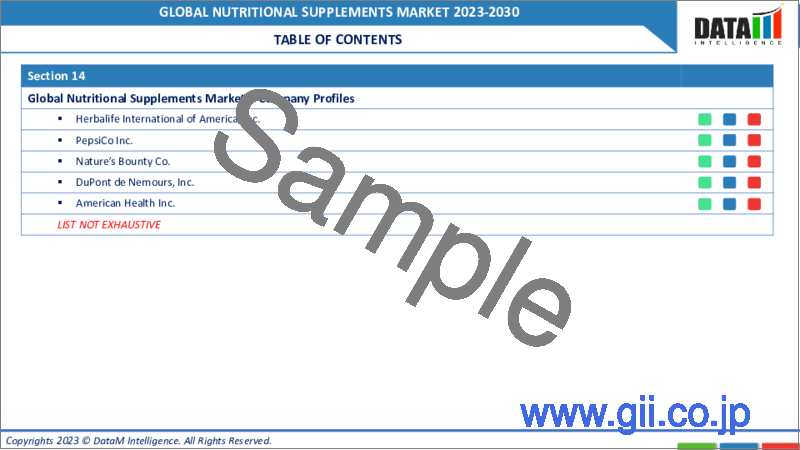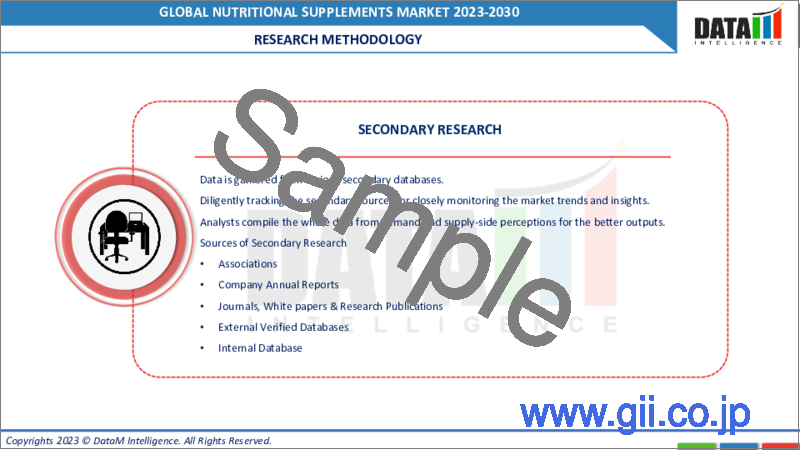|
|
市場調査レポート
商品コード
1336671
栄養補助食品の世界市場-2023年~2030年Global Nutritional Supplements Market - 2023-2030 |
||||||
カスタマイズ可能
適宜更新あり
|
|||||||
| 栄養補助食品の世界市場-2023年~2030年 |
|
出版日: 2023年08月22日
発行: DataM Intelligence
ページ情報: 英文 190 Pages
納期: 即日から翌営業日
|
- 全表示
- 概要
- 目次
市場概要
世界の栄養補助食品市場は、2022年に3,655億米ドルに達し、2023-2030年の予測期間中にCAGR 6.2%で成長し、2030年には5,954億米ドルに達すると予測されています。天然素材や植物由来のサプリメントに対する需要の高まりは、栄養補助食品市場における重要な動向のひとつです。顧客は、健康的で環境に優しい成分を含む製品を求めています。例えば、藻類などに由来するビーガンのオメガ3サプリメントが受け入れられつつあります。
栄養補助食品市場は、健康意識の高まりと健康への積極的なアプローチにより、大幅な成長を遂げています。消費者は、ビタミン、ミネラル、ハーブサプリメント、特殊製品を求めて、健康目標をサポートし、潜在的な栄養素の不足を補おうとしています。健康全般と生活の質における栄養の重要性が高まっていることを反映し、予防医療と個別化された栄養ソリューションに対する需要が高まっていることが、市場の拡大に拍車をかけています。
栄養補助食品に含まれるルテインと亜鉛は、健康に役立ちます。ベータカロチンとビタミンC、E、亜鉛などのビタミンサプリメントやミネラルサプリメントを組み合わせることで、黄斑変性症による視力低下のリスクが27%減少します。特に食事によるルテインの摂取は、黄斑変性症のリスクを低下させる。毎日10mgのルテインを12ヵ月間摂取すると、黄斑変性症の症状が改善する可能性があります。
市場力学
栄養補助食品市場の動向は、健康志向の消費者層の増加が牽引する
健康志向の消費者層の増加は、栄養補助食品市場の主要促進要因です。予防医療と全体的な健康に対する意識の高まりに伴い、消費者はライフスタイルを補完する食事療法を積極的に求めるようになっています。人々がより健康的な生活習慣を取り入れる限り、ビタミンやミネラル製品などの栄養補助食品の需要は急増します。
この動向は、高齢化人口の増加と活力と長寿を維持したいという願望によってさらに拍車がかかっています。さらに、栄養補助食品市場は、個人向けサプリメントや症状別サプリメントの利用可能性の拡大によっても牽引されています。企業は個々のニーズに応えるべく技術革新を進め、さまざまな健康上の懸念に対して的を絞ったソリューションを提供しており、消費者の強い共感を呼んでいます。
栄養補助食品市場はeコマースとデジタルマーケティングの進歩で繁栄する
eコマース業界とデジタルマーケティング戦略は、栄養補助食品業界を大きく発展させました。インターネットショッピングの台頭と製品比較の容易さにより、消費者は自宅にいながらオンラインでサプリメントを入手できる利便性を受け入れています。eコマースは、地理的な制約を取り払い、新たな市場への参入を可能にします。
さらに、インフルエンサー・マーケティング、ソーシャルメディア・プロモーション、有用なコンテンツといったデジタル・マーケティング戦略は、顧客を惹きつけ、ブランド・ロイヤルティを育むために不可欠です。栄養補助食品市場は、オンライン環境が変化し続ける中、テクノロジーとマーケティングの相乗効果から恩恵を受け、スムーズな購買体験を提供し、市場成長を促進しています。
競合の圧力と規制のハードルが世界の栄養補助食品市場に影響を与える
世界の栄養補助食品市場の主な抑制要因は、競合の飽和と規制上の課題です。栄養補助食品の市場シェアは多数のプレーヤーに高度に分散しており、激しい競争を招いているため、個々の企業の成長見通しが制限される可能性があります。さらに、市場は厳しい規制の監視と地域によって異なる基準に直面しており、メーカーにとってコンプライアンスと一貫した品質を確保するためのハードルとなっています。
さらに、栄養補助食品の市場規模は景気変動や消費者の支出パターンの影響を受けやすく、不確実な時期には高級製品に対する需要に影響を与えます。市場関係者はまた、利益率に影響を与える原材料コストの上昇にも遭遇します。こうした課題に対処するには、戦略的なイノベーション、規制の遵守、サプリメントの利点を効果的に伝えることが必要であり、このダイナミックで進化する業界の成長を持続させる必要があります。
COVID-19影響分析
COVID-19分析には、COVID前シナリオ、COVIDシナリオ、COVID後シナリオに加え、価格力学(COVID前シナリオと比較したパンデミック中およびパンデミック後の価格変動を含む)、需給スペクトラム(取引制限、封鎖、およびその後の問題による需給の変化)、政府の取り組み(政府機関による市場、セクター、業界を活性化させる取り組み)、メーカーの戦略的取り組み(COVID問題を緩和するためにメーカーが行ったことをここで取り上げる)が含まれます。
目次
第1章 調査手法と調査範囲
第2章 市場の定義と概要
第3章 エグゼクティブサマリー
第4章 市場力学
- 影響要因
- 促進要因
- 栄養補助食品市場の動向は健康志向の高まりが牽引
- 栄養補助食品市場はeコマースとデジタルマーケティングの進歩で繁栄する
- 抑制要因
- 競合圧力と規制上のハードルが世界の栄養補助食品市場に影響を与える
- 機会
- 影響分析
- 促進要因
第5章 産業分析
- ポーターのファイブフォース分析
- サプライチェーン分析
- 価格分析
- 規制分析
第6章 COVID-19分析
第7章 製品タイプ別
- 栄養補助食品
- スポーツサプリメント
- 美容サプリメント
- その他
第8章 形状別
- カプセル
- 粉末
- 錠剤
- 液体
- その他
第9章 年齢層別
- 児童
- 成人
- 高齢者
第10章 流通チャネル別
- スーパーマーケット/ハイパーマーケット
- 薬局・ドラッグストア
- 専門店
- オンラインストア
- その他
第11章 地域別
- 北米
- 米国
- カナダ
- メキシコ
- 欧州
- ドイツ
- 英国
- フランス
- イタリア
- スペイン
- その他欧州
- 南米
- ブラジル
- アルゼンチン
- その他南米
- アジア太平洋
- 中国
- インド
- 日本
- オーストラリア
- その他アジア太平洋
- 中東・アフリカ
第12章 競合情勢
- 競合シナリオ
- 市況/シェア分析
- M&A分析
第13章 企業プロファイル
- Abbott Nutrition
- 会社概要
- 製品ポートフォリオと説明
- 財務概要
- 主な動向
- Amway
- Nestle
- Glanbia Plc
- Herbalife International of America
- Archer Daniels Midland
- PepsiCo
- Nature's Bounty Co.
- DuPont
- American Health, Inc.
第14章 付録
Market Overview
Global Nutritional Supplements Market reached US$ 365.5 billion in 2022 and is expected to reach US$ 595.4 billion by 2030 growing with a CAGR of 6.2% during the forecast period 2023-2030. The rising demand for natural and plant-based supplements is one significant trend in the nutritional supplements market. Customers are looking for products with healthy and environmentally friendly components. For instance the growing acceptance of vegan omega-3 supplements derived from sources like algae.
The nutritional supplements market is experiencing substantial growth due to rising health consciousness and a proactive approach to well-being. Consumers are seeking vitamins, minerals, herbal supplements, and specialty products to support their health goals and fill potential nutrient gaps. The market's expansion is fueled by the growing demand for preventive healthcare and personalized dietary solutions, reflecting the increasing significance of nutrition in overall health and quality of life.
Lutein and zinc in nutritional supplements offer health benefits. Combining beta-carotene with vitamin supplements and mineral supplements, such as vitamins C, E, and zinc reduces the risk of visual loss from macular degeneration by 27%. Lutein intake, especially through diet, lowers macular degeneration risk. Taking 10 mg of lutein daily for 12 months may improve macular degeneration symptoms.
Market Dynamics
Nutritional Supplements Market Trend is Driven by Growing Health-Conscious Consumer Base
The increasing health-conscious consumer base is a major driver of the nutritional supplements market. With rising awareness of preventive healthcare and overall well-being, consumers are actively seeking dietary solutions to complement their lifestyles. As long as people adopt healthier habits, the demand for nutritional supplements, such as vitamin and mineral products, has surged.
This trend is further fueled by the growing aging population and the desire to maintain vitality and longevity. Moreover, the nutritional supplements market is also driven by the expanding availability of personalized and condition-specific supplements. Companies are innovating to cater to individual needs, offering targeted solutions for various health concerns, which resonate strongly with consumers.
Nutritional Supplements Market Thrives on E-Commerce and Digital Marketing Advancements
The e-commerce industry and digital marketing strategies have greatly advanced the nutritional supplement industry. Due to the rise of internet shopping and the ease of product comparison, consumers are embracing the convenience of obtaining supplements online from the comfort of their homes. E-commerce enables a greater reach, removing geographical restrictions and allowing businesses to enter new markets.
Additionally, digital marketing strategies like influencer marketing, social media promotions, and useful content are essential for attracting customers and fostering brand loyalty. The nutritional supplements market benefits from the synergy between technology and marketing as the online environment continues to change, offering a smooth purchasing experience and driving market growth.
Competitive Pressure and Regulatory Hurdles Impact the Global Nutritional Supplements Market
the key restraints of the global nutritional supplements market are competition saturation and regulatory challenges. Nutritional supplements market share is highly distributed among numerous players, leading to intense competition, which can limit the growth prospects for individual companies. Additionally, the market faces stringent regulatory scrutiny and varying standards across different regions, posing hurdles for manufacturers to ensure compliance and consistent quality.
Moreover, the nutritional supplements market size is susceptible to economic fluctuations and consumer spending patterns, impacting the demand for premium products during uncertain times. Market players also encounter rising raw material costs, affecting profit margins. Addressing these challenges requires strategic innovation, adhering to regulations, and effectively communicating the benefits of supplements to sustain growth in this dynamic and evolving industry.
COVID-19 Impact Analysis
The COVID-19 Analysis includes Pre-COVID Scenario, COVID Scenario, and Post-COVID Scenario along with Pricing Dynamics (Including pricing change during and post-pandemic comparing it to pre-COVID scenarios), Demand-Supply Spectrum (Shift in demand and supply owing to trading restrictions, lockdown, and subsequent issues), Government Initiatives (Initiatives to revive market, sector or Industry by Government Bodies) and Manufacturers Strategic Initiatives (What manufacturers did to mitigate the COVID issues will be covered here).
Segment Analysis
The global nutritional supplements market is segmented based on product type, form, age group, distribution channel, and by region.
Rising Fitness Enthusiasm Boosts Demand for Sports Supplements in the Nutrition Market
The global nutritional supplements market has been segmented by type into dietary supplements, sports supplements, beauty supplements, and others.
Sports supplements are products designed for athletes and fitness lovers. They include protein supplements, amino acids, creatine, multivitamins, and more. These supplements has offers vitamins and minerals to help with muscle growth and performance during workouts. In the nutritional supplements market, Sports Supplements have a market share of about 20%.
This segment is becoming more popular as more people focus on staying fit and active. The demand for Sports Supplements is growing because fitness-conscious individuals are looking for ways to support their workouts and recover faster. As a result, the overall size of the nutritional supplements market for sports products is increasing steadily.
Geographical Analysis
Health Consciousness Propels Asia-Pacific's Nutritional Supplements Market Growth
By region, the nutritional supplements market is segmented into North America, South America, Europe, Asia-Pacific, Middle-east, and Africa.
Due to rising health cognizance among individuals, the nutritional supplements market size is increasing speedily in the Asia-Pacific region. currently, Asia-Pacific regions hold a 35% market share in the global nutritional supplements market. The demand for herbal supplements, sports supplements, protein dietary supplements, omega-3 dietary supplements, multivitamin dietary supplements, and antioxidant dietary supplements is growing as consumers are searching to improve their dietary fitness.
Due to urbanization, accelerated disposable earnings, and changing dietary behavior and present-day lifestyles, the nutritional supplement enterprises inside the Asia-Pacific region are expanding considerably. The nutritional supplements market share is significantly increasing because of a sizable and varied consumer base. A broad variety of items are now simple to get because of developments in e-commerce and digital marketing, which have increased market penetration and fueled the sector's growth.
Competitive Landscape
The major global players in the market include: Abbott Nutrition, Amway, Nestle, Glanbia Plc, Herbalife International of America, Archer Daniels Midland, PepsiCo, Nature's Bounty Co., DuPont, and American Health, Inc.
Why Purchase the Report?
- To visualize the global nutritional supplements market segmentation based on product type, form, age group, distribution channel, and region, as well as understand key commercial assets and players.
- Identify commercial opportunities in the market by analyzing trends and co-development.
- Excel data sheet with numerous data points of nutritional supplements market-level with all segments.
- The PDF report consists of a cogently put-together market analysis after exhaustive qualitative interviews and an in-depth market study.
- Product mapping is available as Excel consists of key products of all the major market players.
The global nutritional supplements market report would provide approximately 69 tables, 71 figures, and 190 Pages.
Target Audience 2023
- Manufacturers/ Buyers
- Industry Investors/Investment Bankers
- Research Professionals
- Emerging Companies
Table of Contents
1. Methodology and Scope
- 1.1. Research Methodology
- 1.2. Research Objective and Scope of the Report
2. Market Definition and Overview
3. Executive Summary
- 3.1. Market Snippet, by Product Type
- 3.2. Market Snippet, by Form
- 3.3. Market Snippet, by Age Group
- 3.4. Market Snippet, by Distribution Channel
- 3.5. Market Snippet, by Region
4. Market Dynamics
- 4.1. Impacting Factors
- 4.1.1. Drivers
- 4.1.1.1. Nutritional Supplements Market Trend is Driven by Growing Health-Conscious Consumer Base
- 4.1.1.2. Nutritional Supplements Market Thrives on E-Commerce and Digital Marketing Advancements
- 4.1.2. Restraints
- 4.1.2.1. Competitive Pressure and Regulatory Hurdles Impact the Global Nutritional Supplements Market
- 4.1.3. Opportunity
- 4.1.4. Impact Analysis
- 4.1.1. Drivers
5. Industry Analysis
- 5.1. Porter's Five Force Analysis
- 5.2. Supply Chain Analysis
- 5.3. Pricing Analysis
- 5.4. Regulatory Analysis
6. COVID-19 Analysis
- 6.1. Analysis of COVID-19
- 6.1.1. Scenario Before COVID
- 6.1.2. Scenario During COVID
- 6.1.3. Scenario Post COVID
- 6.2. Pricing Dynamics Amid COVID-19
- 6.3. Demand-Supply Spectrum
- 6.4. Government Initiatives Related to the Market During the Pandemic
- 6.5. Manufacturer's Strategic Initiatives
- 6.6. Conclusion
7. By Product Type
- 7.1. Introduction
- 7.1.1. Market Size Analysis and Y-o-Y Growth Analysis (%), By Product Type
- 7.1.2. Market Attractiveness Index, By Product Type
- 7.2. Dietary Supplements*
- 7.2.1. Introduction
- 7.2.2. Market Size Analysis and Y-o-Y Growth Analysis (%)
- 7.3. Sports Supplements
- 7.4. Beauty Supplements
- 7.5. Others
8. By Form
- 8.1. Introduction
- 8.1.1. Market Size Analysis and Y-o-Y Growth Analysis (%), By Form
- 8.1.2. Market Attractiveness Index, By Form
- 8.2. Capsule*
- 8.2.1. Introduction
- 8.2.2. Market Size Analysis and Y-o-Y Growth Analysis (%)
- 8.3. Powder
- 8.4. Tablet
- 8.5. Liquid
- 8.6. Others
9. By Age Group
- 9.1. Introduction
- 9.1.1. Market Size Analysis and Y-o-Y Growth Analysis (%), By Age Group
- 9.1.2. Market Attractiveness Index, By Age Group
- 9.2. Kids*
- 9.2.1. Introduction
- 9.2.2. Market Size Analysis and Y-o-Y Growth Analysis (%)
- 9.3. Adults
- 9.4. Geriatric
10. By Distribution Channel
- 10.1. Introduction
- 10.1.1. Market Size Analysis and Y-o-Y Growth Analysis (%), By Distribution Channel
- 10.1.2. Market Attractiveness Index, By Distribution Channel
- 10.2. Supermarkets/Hypermarkets*
- 10.2.1. Introduction
- 10.2.2. Market Size Analysis and Y-o-Y Growth Analysis (%)
- 10.3. Pharmacy and Drug Stores
- 10.4. Specialty Stores
- 10.5. Online Stores
- 10.6. Others
11. By Region
- 11.1. Introduction
- 11.1.1. Market Size Analysis and Y-o-Y Growth Analysis (%), By Region
- 11.1.2. Market Attractiveness Index, By Region
- 11.2. North America*
- 11.2.1. Introduction
- 11.2.2. Key Region-Specific Dynamics
- 11.2.3. Market Size Analysis and Y-o-Y Growth Analysis (%), By Product Type
- 11.2.4. Market Size Analysis and Y-o-Y Growth Analysis (%), By Form
- 11.2.5. Market Size Analysis and Y-o-Y Growth Analysis (%), By Age Group
- 11.2.6. Market Size Analysis and Y-o-Y Growth Analysis (%), By Distribution Channel
- 11.2.7. Market Size Analysis and Y-o-Y Growth Analysis (%), By Country
- 11.2.7.1. The U.S.
- 11.2.7.2. Canada
- 11.2.7.3. Mexico
- 11.3. Europe
- 11.3.1. Introduction
- 11.3.2. Key Region-Specific Dynamics
- 11.3.3. Market Size Analysis and Y-o-Y Growth Analysis (%), By Product Type
- 11.3.4. Market Size Analysis and Y-o-Y Growth Analysis (%), By Form
- 11.3.5. Market Size Analysis and Y-o-Y Growth Analysis (%), By Age Group
- 11.3.6. Market Size Analysis and Y-o-Y Growth Analysis (%), By Distribution Channel
- 11.3.7. Market Size Analysis and Y-o-Y Growth Analysis (%), By Country
- 11.3.7.1. Germany
- 11.3.7.2. The U.K.
- 11.3.7.3. France
- 11.3.7.4. Italy
- 11.3.7.5. Spain
- 11.3.7.6. Rest of Europe
- 11.4. South America
- 11.4.1. Introduction
- 11.4.2. Key Region-Specific Dynamics
- 11.4.3. Market Size Analysis and Y-o-Y Growth Analysis (%), By Product Type
- 11.4.4. Market Size Analysis and Y-o-Y Growth Analysis (%), By Form
- 11.4.5. Market Size Analysis and Y-o-Y Growth Analysis (%), By Age Group
- 11.4.6. Market Size Analysis and Y-o-Y Growth Analysis (%), By Distribution Channel
- 11.4.7. Market Size Analysis and Y-o-Y Growth Analysis (%), By Country
- 11.4.7.1. Brazil
- 11.4.7.2. Argentina
- 11.4.7.3. Rest of South America
- 11.5. Asia-Pacific
- 11.5.1. Introduction
- 11.5.2. Key Region-Specific Dynamics
- 11.5.3. Market Size Analysis and Y-o-Y Growth Analysis (%), By Product Type
- 11.5.4. Market Size Analysis and Y-o-Y Growth Analysis (%), By Form
- 11.5.5. Market Size Analysis and Y-o-Y Growth Analysis (%), By Age Group
- 11.5.6. Market Size Analysis and Y-o-Y Growth Analysis (%), By Distribution Channel
- 11.5.7. Market Size Analysis and Y-o-Y Growth Analysis (%), By Country
- 11.5.7.1. China
- 11.5.7.2. India
- 11.5.7.3. Japan
- 11.5.7.4. Australia
- 11.5.7.5. Rest of Asia-Pacific
- 11.6. Middle East and Africa
- 11.6.1. Introduction
- 11.6.2. Key Region-Specific Dynamics
- 11.6.3. Market Size Analysis and Y-o-Y Growth Analysis (%), By Product Type
- 11.6.4. Market Size Analysis and Y-o-Y Growth Analysis (%), By Form
- 11.6.5. Market Size Analysis and Y-o-Y Growth Analysis (%), By Age Group
- 11.6.6. Market Size Analysis and Y-o-Y Growth Analysis (%), By Distribution Channel
12. Competitive Landscape
- 12.1. Competitive Scenario
- 12.2. Market Positioning/Share Analysis
- 12.3. Mergers and Acquisitions Analysis
13. Company Profiles
- 13.1. Abbott Nutrition
- 13.1.1. Company Overview
- 13.1.2. Product Portfolio and Description
- 13.1.3. Financial Overview
- 13.1.4. Key Developments
- 13.2. Amway
- 13.3. Nestle
- 13.4. Glanbia Plc
- 13.5. Herbalife International of America
- 13.6. Archer Daniels Midland
- 13.7. PepsiCo
- 13.8. Nature's Bounty Co.
- 13.9. DuPont
- 13.10. American Health, Inc.
LIST NOT EXHAUSTIVE
14. Appendix
- 14.1. About Us and Services
- 14.2. Contact Us






